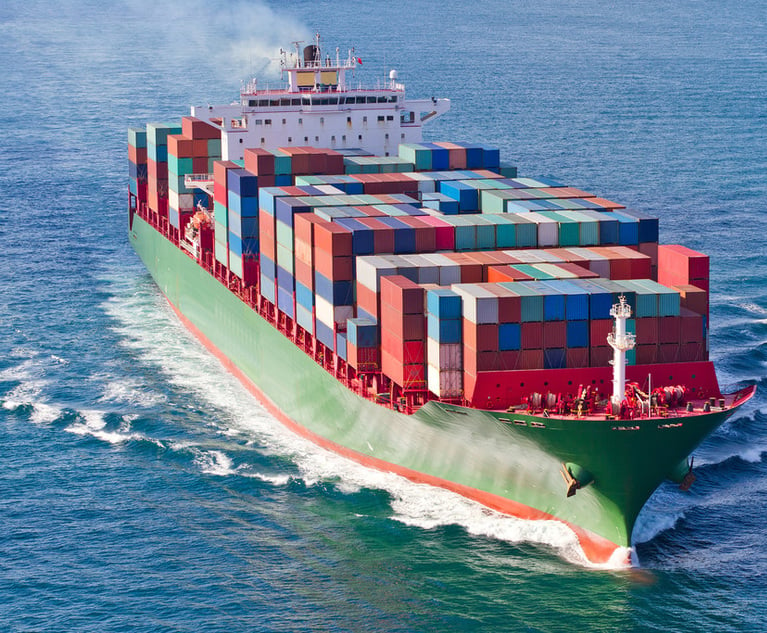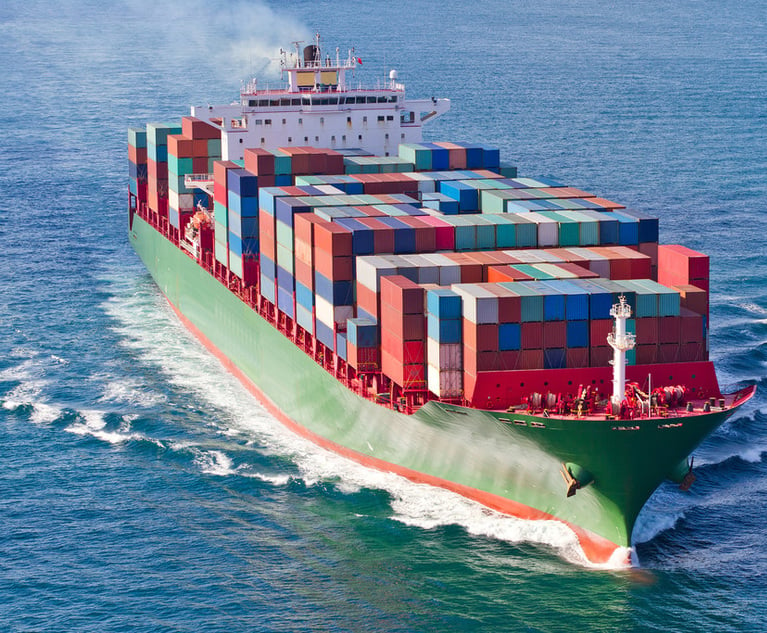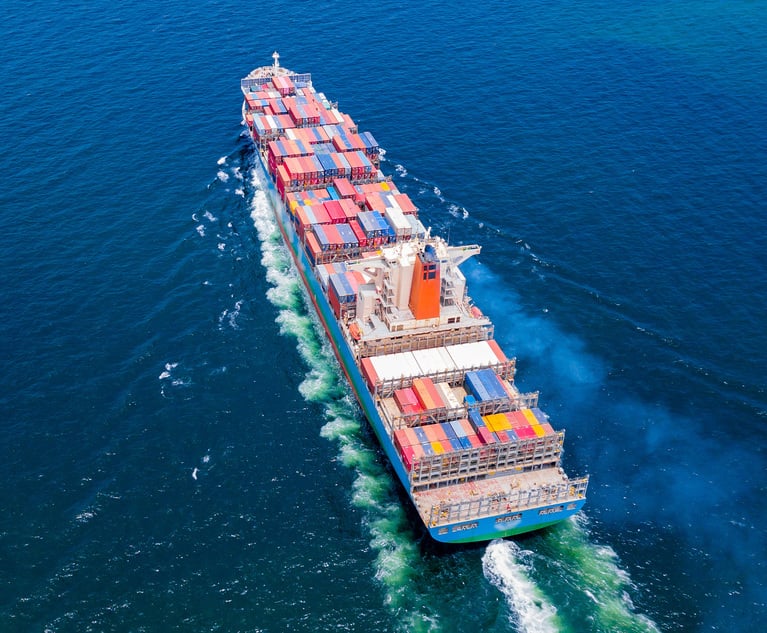Maritime Law Column: A Tale of Two Canals
The simultaneous delays at the Suez and Panama Canals are unprecedented and assuredly will lead to higher transportation costs that will flow down to consumers.
January 04, 2024 at 02:00 PM
5 minute read
Cargo and Shipping
 Credit: EvrenKalinbacak/Adobe Stock
Credit: EvrenKalinbacak/Adobe Stock Ordinarily, over 36,000 merchant ships pass through the Suez and Panama Canals each year representing about 30% of the world's merchant fleet tonnage. This year, both canals face extraordinary events beyond their control, which are affecting vessel transits and arrivals across the globe. Following Hamas' attack on Israeli citizens and Israel's retaliatory response, Houthi rebels in Yemen funded by Iran have launched missile and drone attacks on merchant ships in the Gulf of Aden (Gulf) as they enter and depart the Red Sea. In response to these attacks, numerous major container carriers, as well as major oil and gas tanker operators and car carriers have suspended transits through the Gulf, and the United States is spearheading a multinational task force (Operation Prosperity Guardian) now heading toward the Gulf to protect the world's merchant fleet. Meanwhile, the Panama Canal's Lake Gatun is suffering from an unprecedented drought causing significant delays for vessels transiting between the Gulf of Mexico and Pacific Ocean. Currently, traffic flow is about 75% of normal capacity. Water levels have plunged due to El Niño, a variant of the El Niño/Southern Oscillation (ENSO) that generates above-average water temperatures across the eastern equatorial Pacific Ocean every two to seven years.
These two canals are vessel traffic choke points. Recall the container ship Ever Given closed the Suez Canal for six days in 2021 when it plowed into the canal's east bank and completely blocked traffic north and southbound. That closure slowed trade between Europe, the Middle East and Asia. Similarly, the decision by major merchant vessel operators to suspend Suez routes will require the affected vessels to transit around South Africa's Cape of Good Hope adding thousands of freight miles and numerous days of delay to their respective transits. For vessels transiting to Europe, the added voyage duration will increase the air emissions subject to the European Union's Emissions Trading System (ETS), which took effect Jan. 1, 2024. Fifty percent of such air emissions will be subject to ETS taxation. Further, for those vessels willing to take the risk, additional war risk premiums (AWRP) provide coverage for transits through high-risk areas with charterers directing the vessel through such areas bearing the burden.
This content has been archived. It is available through our partners, LexisNexis® and Bloomberg Law.
To view this content, please continue to their sites.
Not a Lexis Subscriber?
Subscribe Now
Not a Bloomberg Law Subscriber?
Subscribe Now
NOT FOR REPRINT
© 2025 ALM Global, LLC, All Rights Reserved. Request academic re-use from www.copyright.com. All other uses, submit a request to [email protected]. For more information visit Asset & Logo Licensing.
You Might Like
View All
Maritime Law Column: When Is a Contract Maritime and Why Is That Important?
7 minute read

Maritime Law Column: Texas Maritime Public Infrastructure Projects to Watch
6 minute read
Law Firms Mentioned
Trending Stories
- 1Settlement Allows Spouses of U.S. Citizens to Reopen Removal Proceedings
- 2CFPB Resolves Flurry of Enforcement Actions in Biden's Final Week
- 3Judge Orders SoCal Edison to Preserve Evidence Relating to Los Angeles Wildfires
- 4Legal Community Luminaries Honored at New York State Bar Association’s Annual Meeting
- 5The Week in Data Jan. 21: A Look at Legal Industry Trends by the Numbers
Who Got The Work
J. Brugh Lower of Gibbons has entered an appearance for industrial equipment supplier Devco Corporation in a pending trademark infringement lawsuit. The suit, accusing the defendant of selling knock-off Graco products, was filed Dec. 18 in New Jersey District Court by Rivkin Radler on behalf of Graco Inc. and Graco Minnesota. The case, assigned to U.S. District Judge Zahid N. Quraishi, is 3:24-cv-11294, Graco Inc. et al v. Devco Corporation.
Who Got The Work
Rebecca Maller-Stein and Kent A. Yalowitz of Arnold & Porter Kaye Scholer have entered their appearances for Hanaco Venture Capital and its executives, Lior Prosor and David Frankel, in a pending securities lawsuit. The action, filed on Dec. 24 in New York Southern District Court by Zell, Aron & Co. on behalf of Goldeneye Advisors, accuses the defendants of negligently and fraudulently managing the plaintiff's $1 million investment. The case, assigned to U.S. District Judge Vernon S. Broderick, is 1:24-cv-09918, Goldeneye Advisors, LLC v. Hanaco Venture Capital, Ltd. et al.
Who Got The Work
Attorneys from A&O Shearman has stepped in as defense counsel for Toronto-Dominion Bank and other defendants in a pending securities class action. The suit, filed Dec. 11 in New York Southern District Court by Bleichmar Fonti & Auld, accuses the defendants of concealing the bank's 'pervasive' deficiencies in regards to its compliance with the Bank Secrecy Act and the quality of its anti-money laundering controls. The case, assigned to U.S. District Judge Arun Subramanian, is 1:24-cv-09445, Gonzalez v. The Toronto-Dominion Bank et al.
Who Got The Work
Crown Castle International, a Pennsylvania company providing shared communications infrastructure, has turned to Luke D. Wolf of Gordon Rees Scully Mansukhani to fend off a pending breach-of-contract lawsuit. The court action, filed Nov. 25 in Michigan Eastern District Court by Hooper Hathaway PC on behalf of The Town Residences LLC, accuses Crown Castle of failing to transfer approximately $30,000 in utility payments from T-Mobile in breach of a roof-top lease and assignment agreement. The case, assigned to U.S. District Judge Susan K. Declercq, is 2:24-cv-13131, The Town Residences LLC v. T-Mobile US, Inc. et al.
Who Got The Work
Wilfred P. Coronato and Daniel M. Schwartz of McCarter & English have stepped in as defense counsel to Electrolux Home Products Inc. in a pending product liability lawsuit. The court action, filed Nov. 26 in New York Eastern District Court by Poulos Lopiccolo PC and Nagel Rice LLP on behalf of David Stern, alleges that the defendant's refrigerators’ drawers and shelving repeatedly break and fall apart within months after purchase. The case, assigned to U.S. District Judge Joan M. Azrack, is 2:24-cv-08204, Stern v. Electrolux Home Products, Inc.
Featured Firms
Law Offices of Gary Martin Hays & Associates, P.C.
(470) 294-1674
Law Offices of Mark E. Salomone
(857) 444-6468
Smith & Hassler
(713) 739-1250






